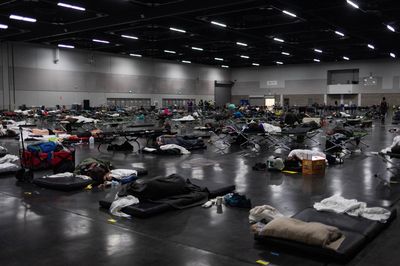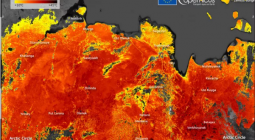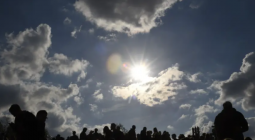Ruthless Heat Wave Baking U.S. Northwest Triggers First Blackout

The unrelenting heat wave that shattered temperature records across the U.S. Pacific Northwest on Monday and threatens to smother the region for another six straight days has begun to trigger rolling blackouts in some parts.
For the first time in the company’s history, Avista Corp. -- which supplies electricity to nearly 340,000 homes and businesses in the Northwest -- instituted rotating outages after parts of its system overloaded. The blackouts, which were affecting about 9,300 customers late Monday, are expected to last into Tuesday. Across all of Washington and Oregon, more than 30,000 customers were in the dark, according to PowerOutage.US, which compiles utility outage data.
While Avista was the first major utility to report rolling blackouts, it may not be the last. Prolonged heat waves such as the one bearing down on the Northwest this week threaten to blow transformers, strain power lines and break down other equipment over time. During a 10-day heat wave across California in 2006, utilities lost more than 1,500 transformers, each knocking out one neighborhood in the process. There were signs of other systems under strain, too: Portland’s streetcar system was suspended. Seattle’s Sound Transit system said trains may operate at reduced speeds.
Avista has never “experienced this kind of demand on our system and this kind of impact to our system,” Heather Rosentrater, senior vice president of energy delivery at the utility company, said during a press conference Monday. “This is very unprecedented.”
The extended heat wave gripping a region usually defined by cool weather and rain has become one of the most powerful examples yet of how climate change is driving temperatures to records around the world, even in the most unexpected of places. Moscow last week was its hottest since 1901. The United Arab Emirates recently hit 125 degrees Fahrenheit (52 degrees Celsius).
In the Pacific Northwest, warmth is building under a so-called heat dome. That’s what happens when there are kinks in a jet stream of fast-flowing air currents that pin summer weather in place, leading to heat waves and drought, plus storms and flooding elsewhere -- all underscoring the risks authorities expect to intensify throughout the season.
Portland hit a record of 115 degrees Fahrenheit (46 Celsius) Monday, as locations across the region notched new all-time highs. Seattle-Tacoma International Airport touched 108 degrees, while in Canada, Lytton in British Columbia set a new national record a day after shattering a previous high that had stood since 1937.
It is unheard of to have temperature records in Portland and Seattle repeatedly broken on successive days, said Bob Oravec, a senior branch forecaster with the U.S. Weather Prediction Center in College Park, Maryland. “That just doesn’t occur.”

Photographer: Maranie Staab/Bloomberg
Alison Eisinger, director of the Seattle/King County Coalition on Homelessness, said aid groups are giving out frozen water bottles, setting up misting stations and trying to help homeless people find ways to avoid the sun as heat hits them especially hard.
“People who are surviving outside may not have a safe place to be in the shade, to get access to water,” she said. “Dehydration is a huge, huge risk.”
An excessive heat warning is also in effect for Northern California, which is forecast to climb as high as 113 degrees. The state’s power grid operator has warned that it may need to ask for conservation to avoid rolling outages.
Hot weather will persist over much of interior #NorCal this week. The Delta Breeze will provide relief for the #Sacramento and #Stockton areas for most of the week. #CAwx pic.twitter.com/Rssb2VfyZR
— NWS Sacramento (@NWSSacramento)June 28,
The weather frying the Northwest also poured heavy rain across central states and will bring a heat wave to New York and the Northeast, with the coming days in the 90s. Heat advisories stretch from Bangor, Maine, where humidity will make temperatures feel more like 100 or higher, down to Philadelphia.
The heat has triggered power grid warnings in the East. The operator of the largest U.S. grid, which stretches from Washington to Chicago, asked transmission and generation owners to suspend maintenance Monday across most areas. The neighboring Midcontinent Independent System Operator did the same.
Power and gas prices climbed across the U.S. on Monday. Electricity prices at a Pacific Northwest hub for delivery over the weekend and Monday jumped 435% to $334.22 a megawatt-hour, data compiled by Bloomberg show. Some Southern California prices doubled from a day before. Even spot power prices in New England, Ohio and Pennsylvania jumped Monday afternoon.
Meanwhile, U.S. natural gas futures rose for a sixth day as the heat wave in the Northwest raises power demand and depletes inventories.
Flood warnings cover parts of eastern New Mexico and west Texas, as well as Missouri, Illinois, Indiana, and Michigan as cooler air and rain soak those regions.
Overnight lows in Oregon and Washington are meanwhile topping highs elsewhere. Temperatures will only fall to 81 degrees in Yakima, Washington. Meanwhile, Houston was forecast to peak at 79, according to the weather service.
— With assistance by Cameron Minnard, Naureen S Malik, and Natalie Obiko Pearson
June 2021
Bloomberg Green




